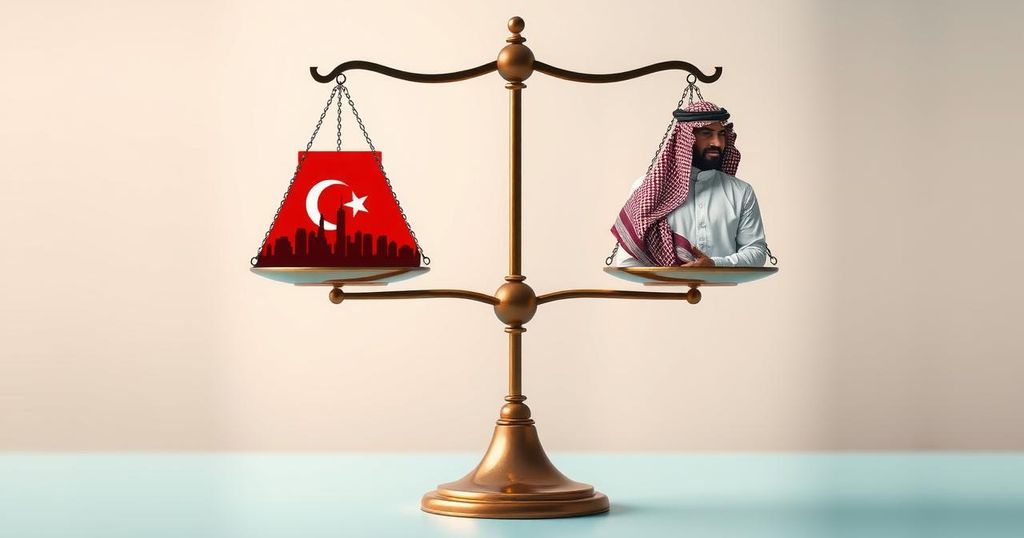Sharaa’s Diplomatic Balancing Act: Weighing Saudi Arabia and Turkey in Syria’s Future

Syria’s interim President Ahmed al-Sharaa recently engaged with both Turkey and Saudi Arabia, emphasizing a strategic balance between the two regional powers amid competition for influence. Erdogan offered strong support for Syria’s reconstruction, which Sharaa acknowledged. However, Sharaa’s visit to Saudi Arabia signals a nuanced approach as he looks to establish his leadership amidst potential tensions with Turkey, driven by nationalistic sentiments.
Interim President Ahmed al-Sharaa of Syria visited Ankara recently following a trip to Saudi Arabia, indicating a strategic balancing act between these regional powers amid the ongoing influence competition over Syria. President Recep Tayyip Erdogan warmly hosted Sharaa, emphasizing the importance of their meeting and announcing Turkey’s commitment to support Syria’s reconstruction efforts. Sharaa expressed gratitude for Turkey’s significant contributions to ensure Syria’s political and economic success, highlighting the assistance in maintaining the country’s unity and territorial integrity.
During his leadership, Sharaa has formed close ties with Turkey, especially as Ankara provided refuge to many displaced Syrians and protected the Idlib enclave, where Sharaa was based. Aydin Selcen, a former Turkish diplomat, noted that Ankara would likely be viewed favorably by the new Syrian leadership due to Turkey’s ongoing support, hosting over five million Syrian refugees.
Despite the extended discussions between Sharaa and Erdogan, no substantial agreements were finalized, only general commitments to cooperation regarding security and development. Significantly, Sharaa chose Saudi Arabia for his first official overseas visit, indicating a deliberate message to Ankara given its competitive regional stance. Professor Huseyin Bagci suggested that Sharaa’s Arab nationalist views might lead to divergent opinions on regional policies with Turkey in the future.
Turkey faces challenges in its quest for influence in Syria due to its ongoing economic difficulties, particularly when compared to oil-rich Saudi Arabia. However, Sharaa has demonstrated a willingness to engage with various nations for Syria’s reconstruction, showing a pragmatic mindset. Sezin Oney noted that Syria’s engagement with Turkey would ultimately revolve around mutual interests, complicating future relations with Ankara.
Additionally, Turkey’s military involvement in Syria poses potential tension as Sharaa’s regime seeks to redefine its stance. Iran, another key player, is already attempting to adapt to the new Syrian government, distinguishing itself from past allegiances with the Assad regime. Nevertheless, Turkey retains significant leverage and expertise that could benefit Syria’s rebuilding efforts, despite the competitive landscape in Damascus.
The article discusses the evolving political landscape in Syria, particularly regarding the interim presidency of Ahmed al-Sharaa and the dynamics between Turkey and Saudi Arabia as they vie for influence over Syria. Sharaa’s visits to both Ankara and Saudi Arabia reflect an intention to navigate these relationships strategically, and the underlying geopolitical implications are highlighted. The historical context of Turkey’s involvement in Syria, including support for Syrian refugees and opposition to the Assad regime, sets the stage for understanding Sharaa’s leadership and future relations with these countries.
In conclusion, Ahmed al-Sharaa’s diplomatic maneuvers illustrate the delicate balance Syria must strike amidst competing influences from Turkey and Saudi Arabia. While expressing appreciation for Turkey’s assistance in reconstruction, Sharaa’s simultaneous outreach to Saudi Arabia signals a careful attempt to maintain independence and unite the region’s Arab nationalism. As Syria seeks to navigate its future, relations with both Ankara and Riyadh will be crucial in rebuilding efforts amid geopolitical complexities.
Original Source: www.rfi.fr








